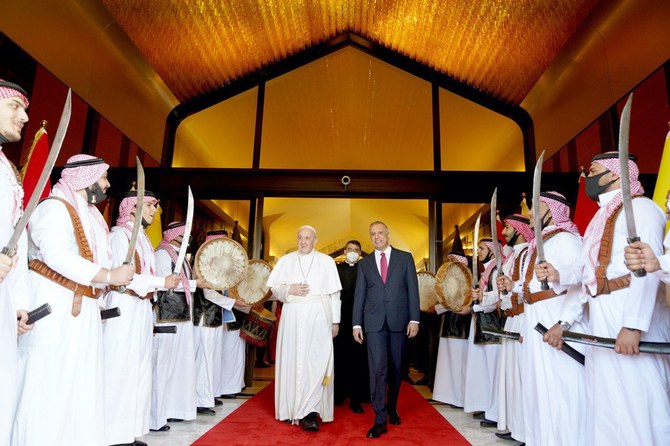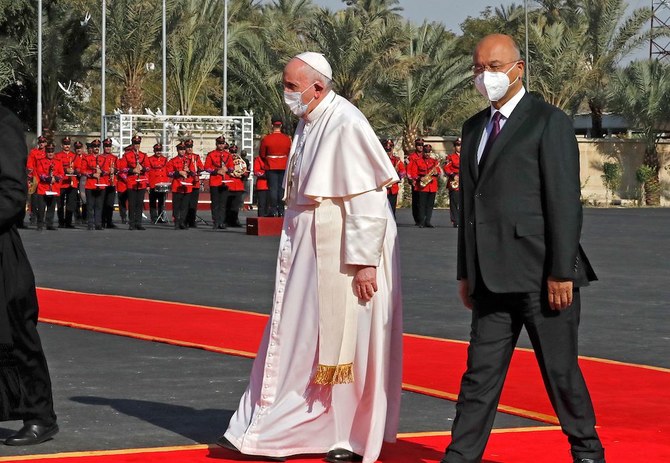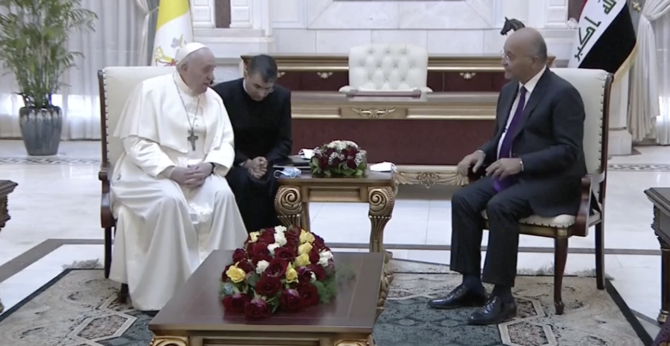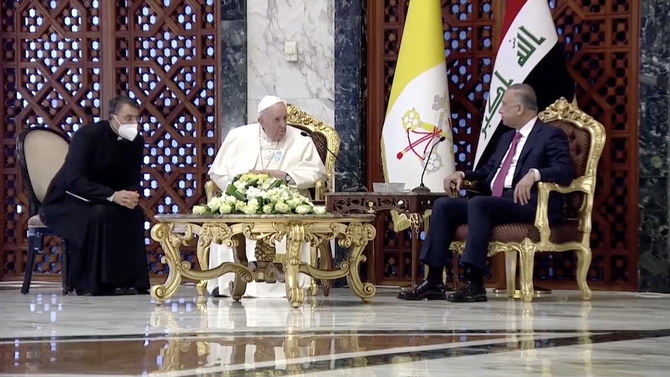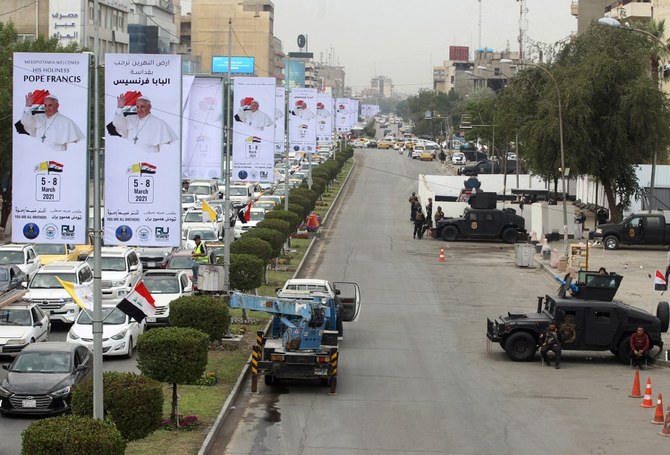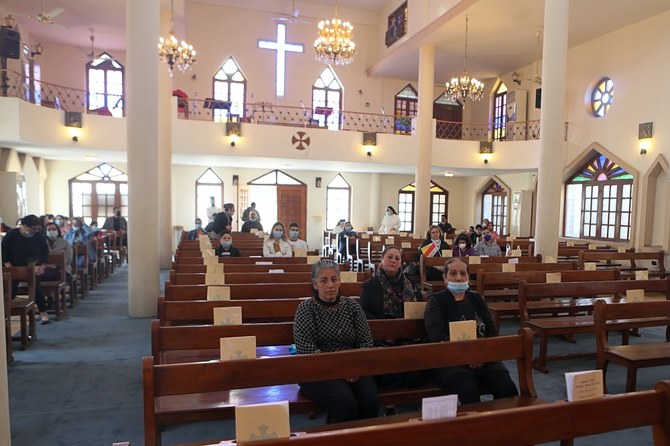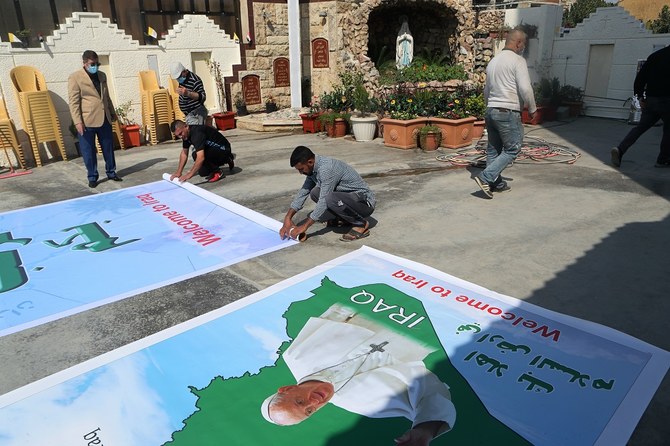DUBAI: Pope Francis called for an end to extremism and violence in his opening address Friday on the first-ever papal visit to Iraq, long scarred by war and now gripped by coronavirus.
The 84-year-old pontiff, who said he was making the first-ever papal visit to Iraq as a ‘pilgrim of peace,’ will also reach out to Shiite Muslims when he meets Iraq’s top cleric, Grand Ayatollah Ali Al-Sistani.
The Pope landed in the afternoon at Baghdad's International Airport, where he was greeted by Prime Minister Mustafa Al-Kadhimi, as well as groups showcasing Iraq's diverse folklore music and dance.
He then met with President Barham Saleh, who had extended the official invitation to the pontiff in 2019, as well as other government and religious figures.
“May there be an end to acts of violence and extremism, factions and intolerance!” he urged in the stirring address, his first after arriving in the country.
Follow live coverage of his first day itinerary below... (All times GMT)
16:30 - WATCH: Before the 2003 US invasion, there were an estimated 1 million Christians living in Iraq, but now their numbers are believed to be in the low thousands or even the hundreds.
Rev. Nadhir Dako of Baghdad’s St. Joseph’s Cathedral, which the Pope will visit during his trip, explains in the video below why so many Christians continue to leave.
15:00 - That concludes the public engagement of the Pope on the first day of his trip.
On Saturday, Pope Francis will travel by plane to the cities of Najaf and Ur, where he will meet Grand Ayatollah Ali Al-Sistani, the spiritual leader of Iraq’s Shiites.
READ MORE
Go to Arab News' dedicated In Focus section on the Pope's visit to Iraq for coverage of the historic trip. Click here.
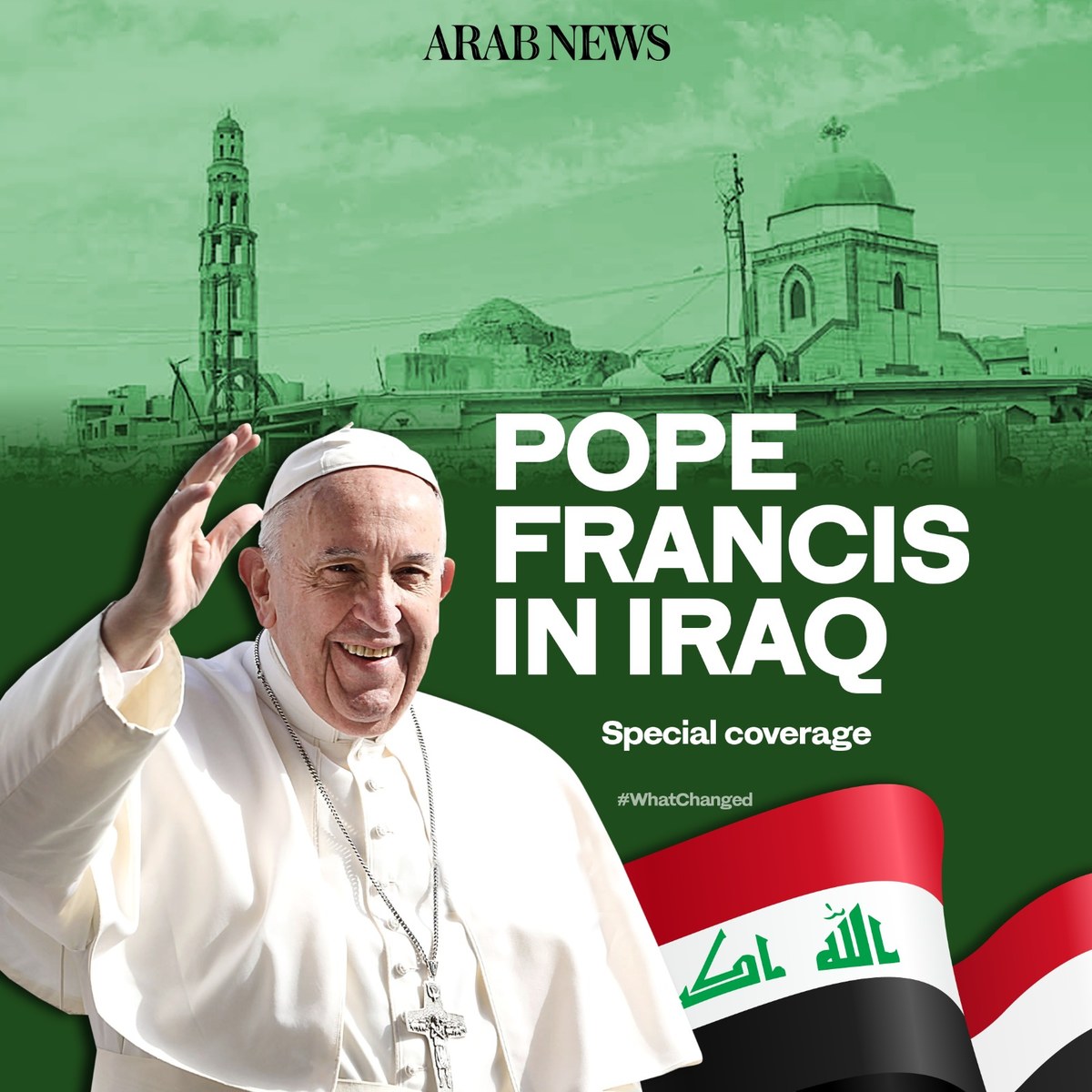
14:15 - During his flight from Rome to Baghdad, the Pope sent telegrams while flying over Palestine, Israel, and finally Jordan, to each of the respective heads of state.
Overflight Palestine
HIS EXCELLENCY MAHMOUD ABBAS - PRESIDENT OF THE STATE OF PALESTINE
AS I FLY OVER PALESTINIAN TERRITORY ON MY APOSTOLIC JOURNEY TO IRAQ, I EXTEND CORDIAL GREETINGS TO YOUR EXCELLENCY AND YOUR FELLOW CITIZENS, AND I PRAY THAT THE MOST HIGH GOD WILL BLESS ALL PALESTINIANS WITH PEACE AND WELL-BEING. FRANCISCUS PP.
Overflight Israel
HIS EXCELLENCY REUVEN RIVLIN - PRESIDENT OF THE STATE OF ISRAEL
ENTERING ISRAELI AIRSPACE ON MY APOSTOLIC JOURNEY TO IRAQ, I SEND WARM GREETINGS TO YOU AND THE PEOPLE OF THE NATION, PRAYING THAT ALMIGHTY GOD WILL BLESS ALL WITH HIS GIFTS OF HARMONY AND PEACE. FRANCISCUS PP.
Overflight Jordan
HIS MAJESTY ABDULLAH II - KING OF JORDAN
I OFFER CORDIAL GREETINGS TO YOUR MAJESTY, THE MEMBERS OF THE ROYAL FAMILY AND THE PEOPLE OF JORDAN AS I FLY OVER JORDANIAN AIRSPACE ON MY APOSTOLIC JOURNEY TO IRAQ. UPON THE ENTIRE NATION, I INVOKE THE ABUNDANT BLESSINGS OF THE MOST HIGH. FRANCISCUS PP.
14:00 - Next, Pope Francis visits Our Lady of Salvation Syro-Catholic Cathedral in Bagdhad, where he will meet with worshippers, bishops & religious figures. Video below.
13:45 - WATCH - ICYMI: Pope Francis and the Iraqi prime minister Mustafa Al-Kadhimi are greeted by traditional dancing shortly after the pontiff's arrival in Iraq.
13:30 - Pope Francis' address at the Presidential Palace touches upon the need for Iraq's internal differences to be resolved and how its institutions fighting corruption must be strengthened.
13:00 - After a brief discussion, and exchange of symbolic gifts and a look at some of the artifacts of the Presidential Palace, Pope Francis and Salih now hold a short briefing.
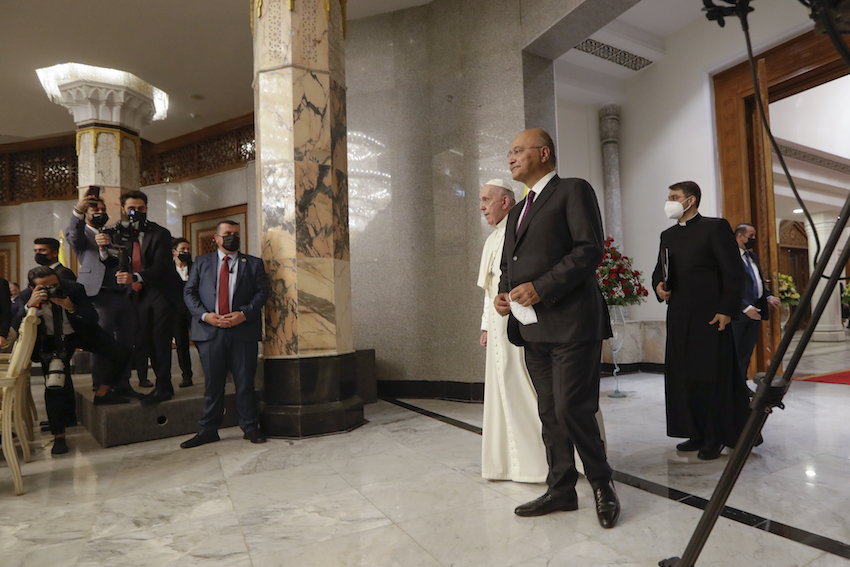
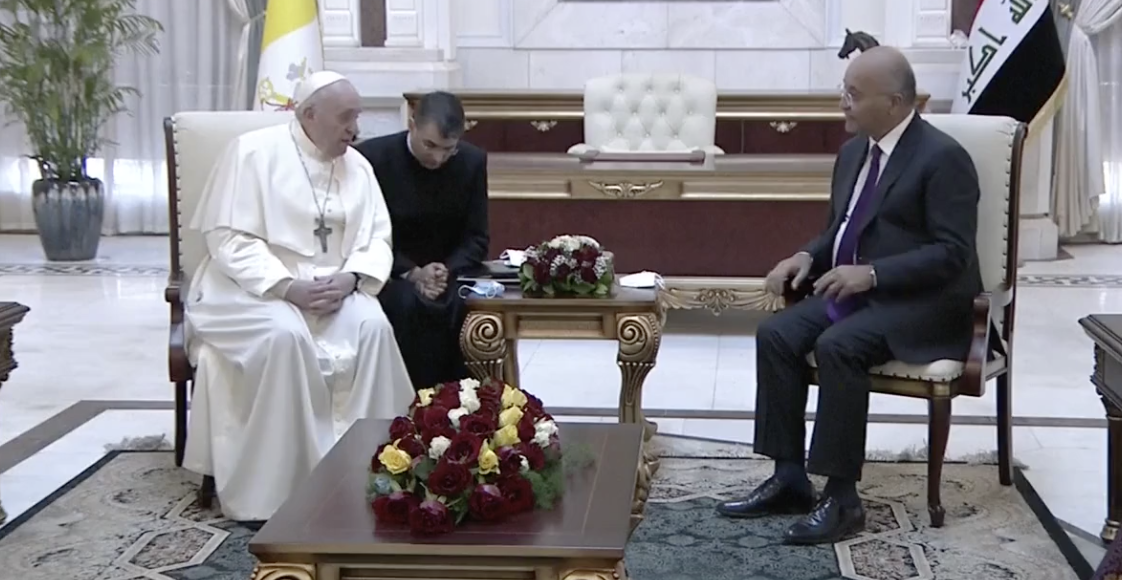
12:15 - President Barham Salih greets the Holy Father and, as a symbol of peace, doves are released into the Baghdad sky...
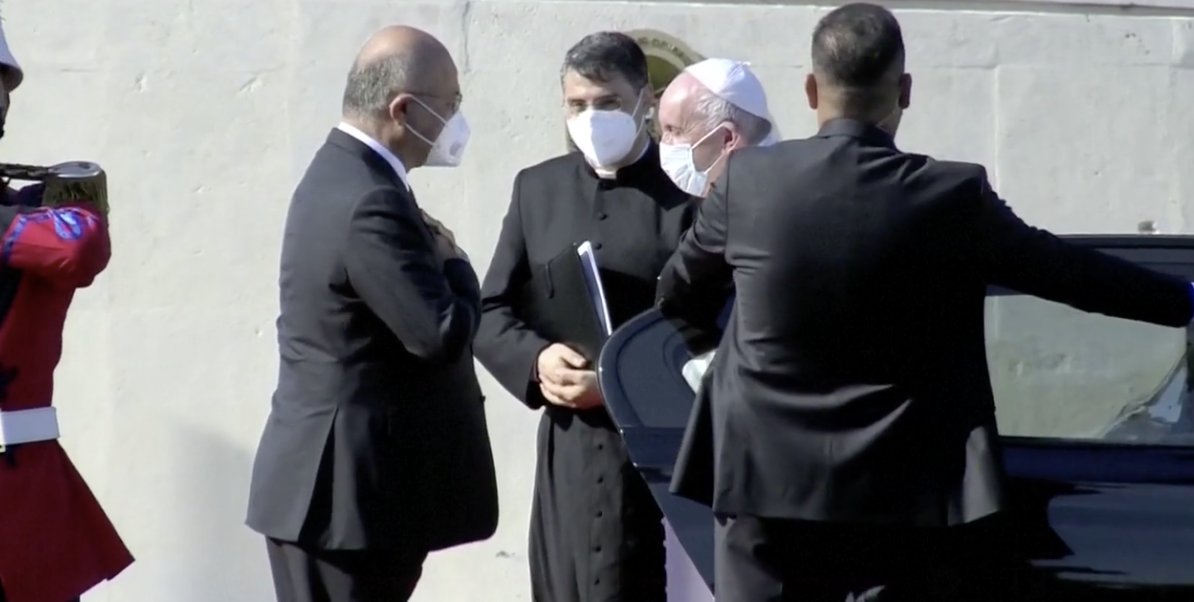
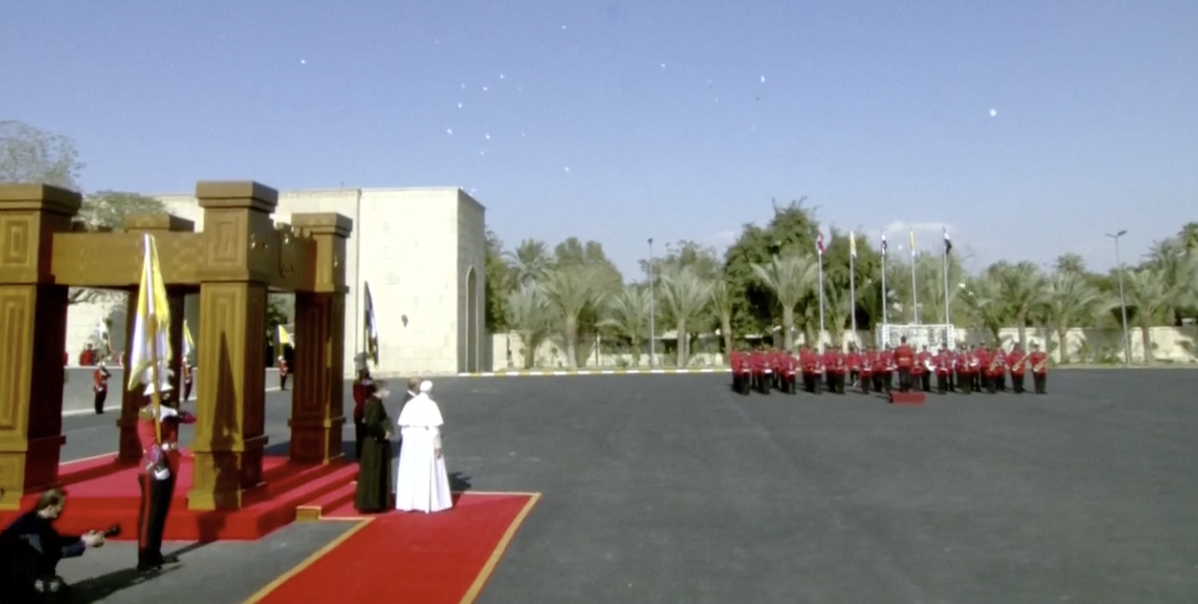
12:00 - Next on the Pope's agenda is an official welcome ceremony at the Presidential Palace in Baghdad, where he will meet with President Salih in the private office of the palace.
11:30 - Following a brief discussion with the Iraq prime minister, the Pope will head to the Presidential Palace for a reception with President Salih. On leaving the airport, the Pope was treated to traditional Iraqi dance.
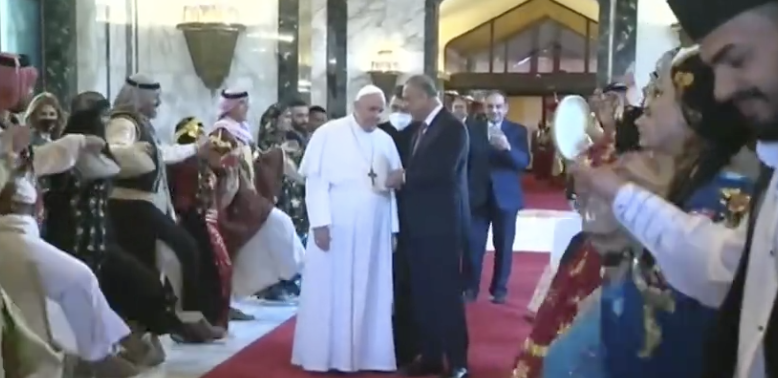
11:15 - Pope Francis and Al-Kadhimi now head into a VIP hall within the airport for an official reception and welcome.
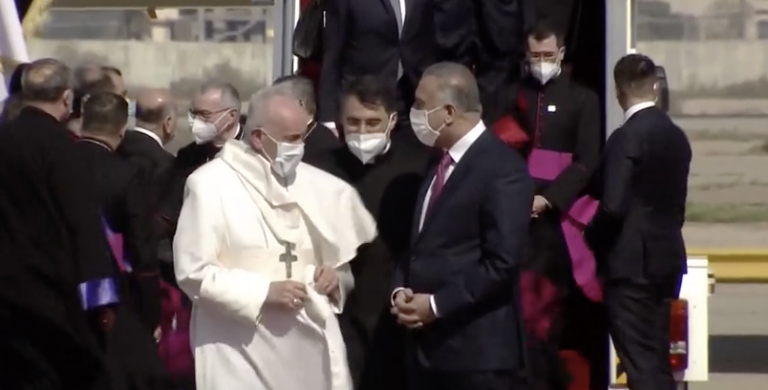
11:00 - The Pope touches down at Baghdad International Airport, where he will receive an official welcome and meet with Iraqi prime minister Al-Kadhimi.
#LIVE: Pope Francis lands in #Baghdad for the start of his #Iraq trip #PopeFrancisInIraq https://t.co/Gy63vcPASY
— Arab News (@arabnews) March 5, 2021
09:45 - Here is what to expect during his four days of stay in Iraq:
Day 1: Baghdad
Upon arrival in Iraq, Pope Francis will meet privately with Prime Minister Mustafa Al-Kadhimi.
Then, following an official welcome ceremony at the Presidential Palace, Pope Francis will visit President Barham Salih. The Holy Father’s first public event will be with authorities, civil society and the diplomatic corps at 3:45 p.m. in the Presidential Palace.
Afterwards, he will travel to the Syriac-Catholic Cathedral of “Our Lady of Salvation” and meet with Bishops, priests, religious persons, seminarians and catechists.
READ: Massive security preparations in Iraq to protect Pope Francis during his four-day visit
Day 2: Najaf, Ur, Baghdad
On Saturday, Pope Francis will travel by plane to the cities of Najaf and Ur, before returning to Baghdad.
The Pope’s first event of the day is a courtesy visit in Najaf to Grand Ayatollah Ali Al-Sistani, the spiritual leader of Iraq’s Shiites.
He will then depart for Nasiriya to lead an interreligious meeting at the Plain of Ur.
The Pope will then return to Baghdad, where he will celebrate the Divine Liturgy at the Chaldean Cathedral of Saint Joseph.
WATCH: Preparations for Pope Francis’s Holy Mass at the Chaldean Cathedral of Saint Joseph, video below
READ: Pope Francis’ visit to give hope and comfort to Iraqis of all faiths
Day 3: Irbil, Mosul, Qaraqosh
On Sunday, his third day in Iraq, Pope Francis will travel to Irbil, Mosul and Qaraqosh.
He is due to be welcomed upon his arrival in Irbil by the President of the autonomous region of Iraqi Kurdistan and the civil authorities of the region.
He will then meet with Nechirvan Barzani and Masrour Barzani, respectively President and Prime Minister of the autonomous region, privately, before departing by helicopter for Mosul.
In Mosul, Pope Francis will lead a prayer of suffrage for war victims at Hosh Al-Bieaa.
He will then travel to Qaraqosh where he will visit the faithful at the Church of the Immaculate Conception.
Afterwards, he will return to Irbil where he will celebrate Holy Mass at the ‘Franso Hariri’ stadium. The Pope will then travel back to Baghdad after the Holy Mass.
WATCH: Iraqi Christians in California watch Pope Francis’s visit from afar, video below
READ: Papal visit brings joy and sadness for Iraq’s dwindling Christian community
Day 4: Baghdad, Rome
Pope Francis will depart from Baghdad International Airport following a brief farewell ceremony. He is expected to arrive at Rome’s Ciampino Airport at late evening.


